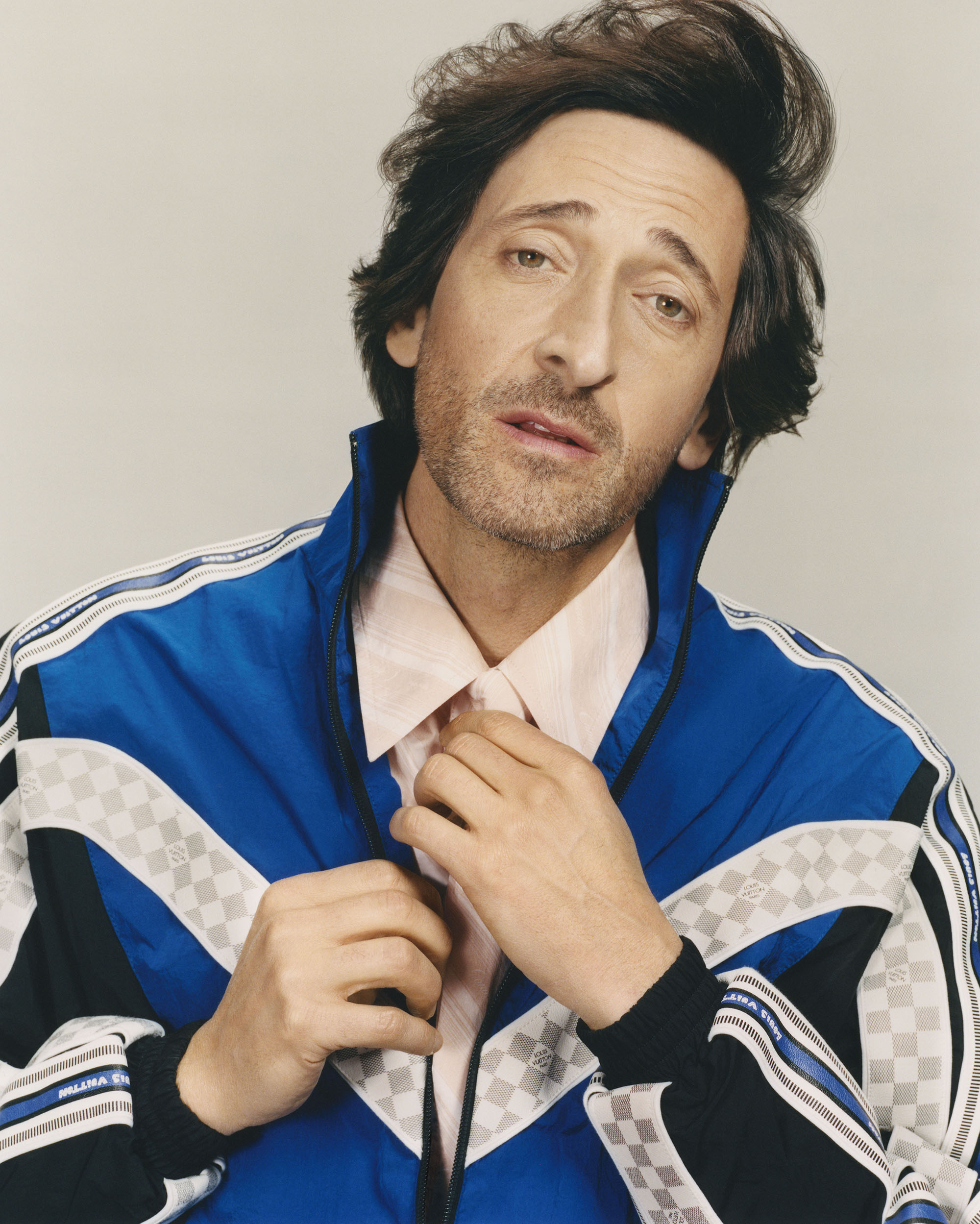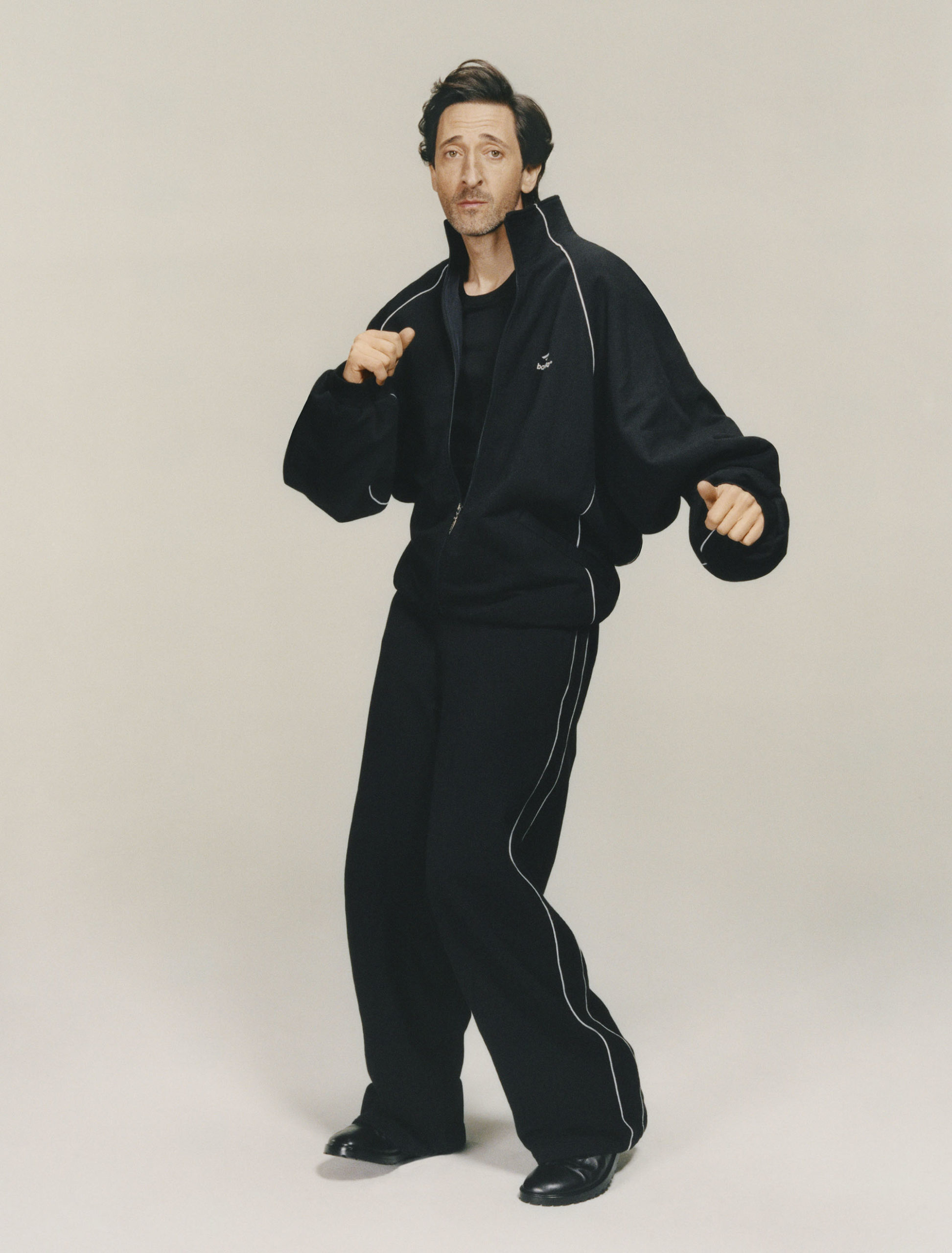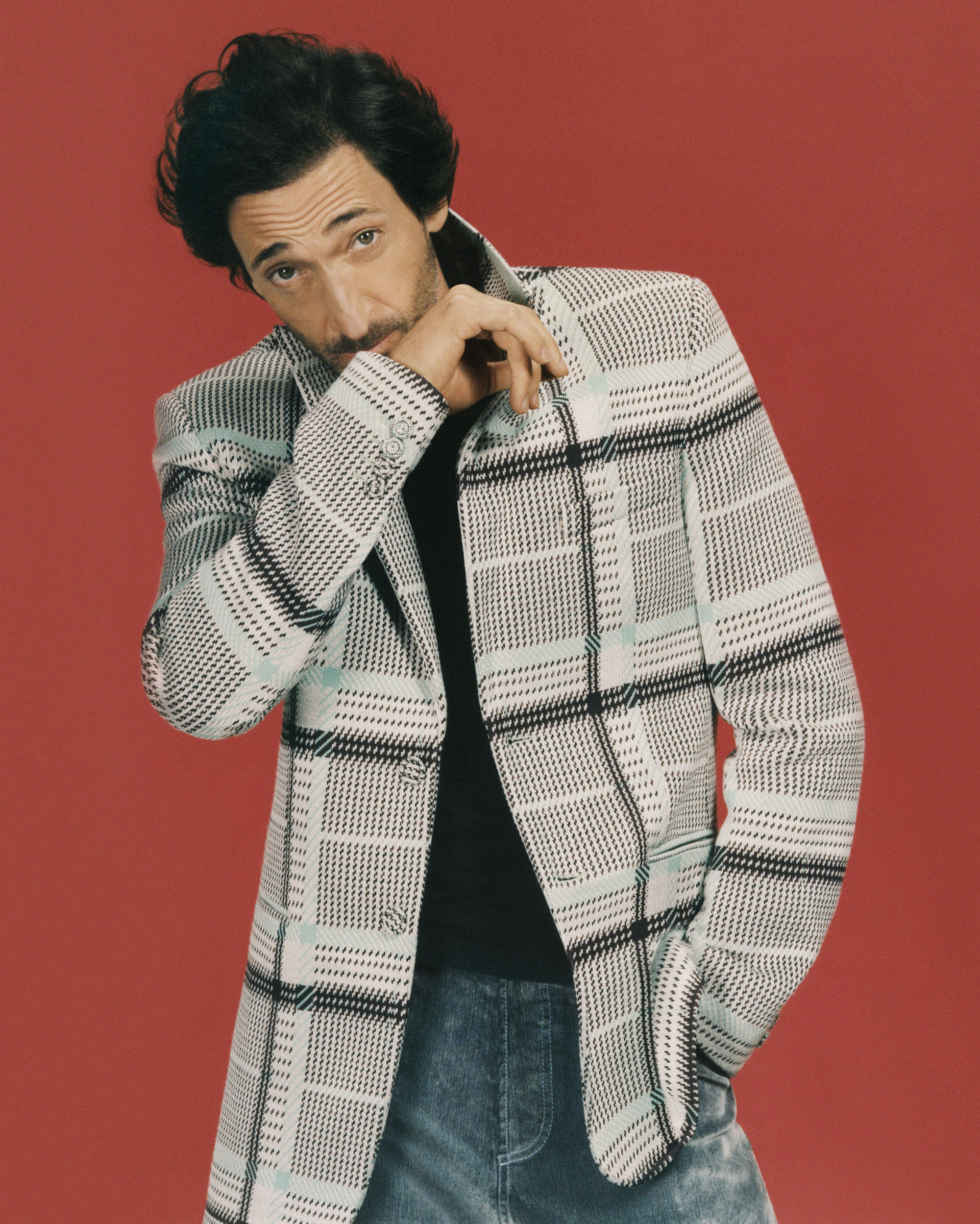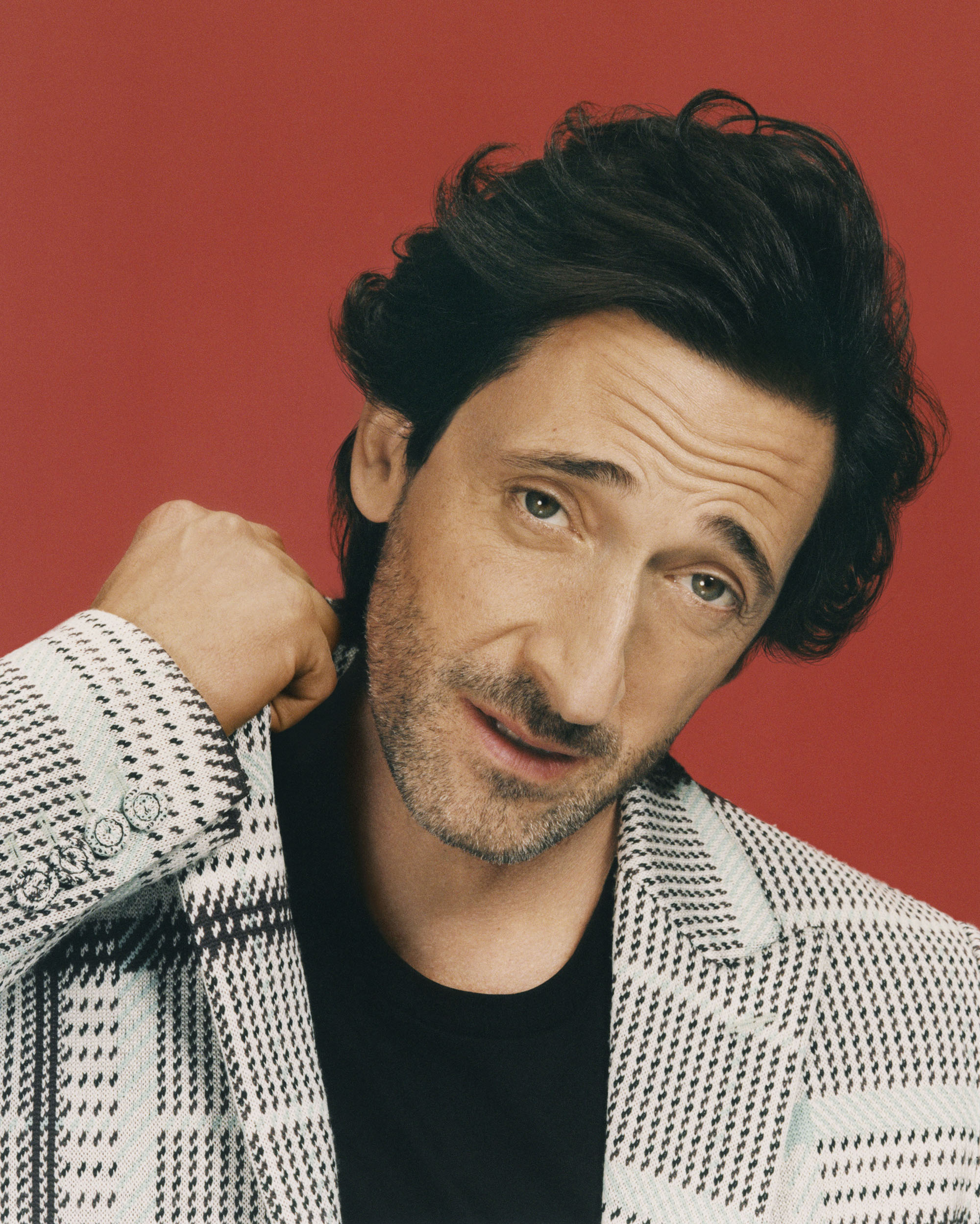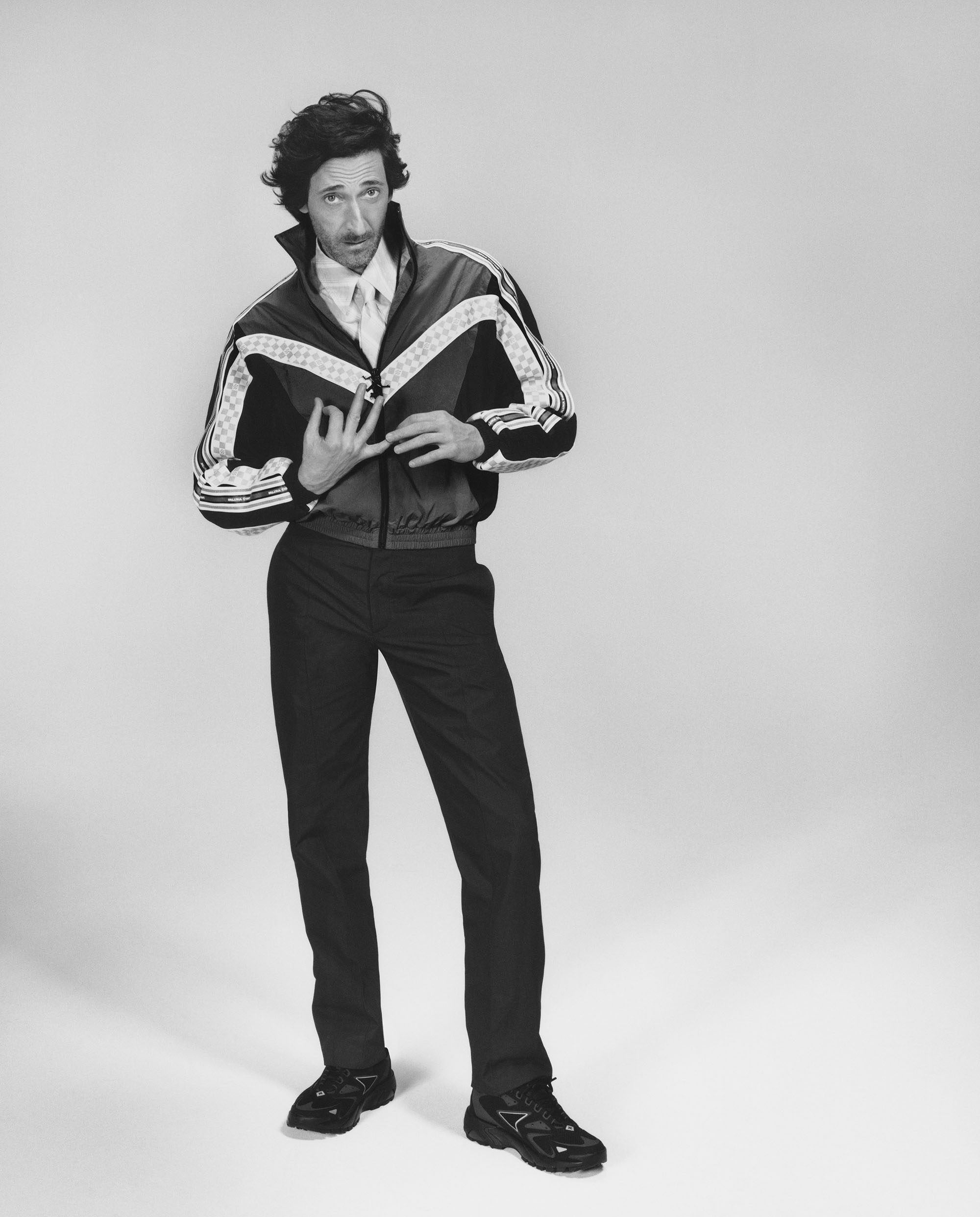
Adrien Brody and Jeremy Strong on Finding Pleasure in the Pain

Whether learning Chopin or mastering ventriloquism, playing Harry Houdini, or—in this spring’s HBO drama, Winning Time: The Rise of the Lakers Dynasty—the legendary basketball coach Pat Riley, Adrien Brody goes the distance. And while the road has been bumpy, he’s as committed as ever. Fresh off the release of Clean, a drama he cowrote, produced, scored, and starred in, the 48-year-old Oscar winner stepped into HBO’s Succession and all but stole the show as the mercurial investor Josh Aaronson. Here, he speaks to his onscreen rival, and one of the few actors in Hollywood to match his famous intensity, Jeremy Strong, about the difference between actors and movie stars, the freedom of other art forms, and the universality of suffering. —JESSE DORRIS
———
ADRIEN BRODY: Where do we begin?
JEREMY STRONG: I want to begin with Clean,1 which is a powerhouse piece of work.
BRODY: Thank you so much.
STRONG: You were really involved in making the film. You cowrote it. You scored it. You said that in some ways it’s a reflection of your own frustrations. What did you mean by that?
BRODY: It’s very apparent to all of us that the world is ill, so to speak. We are consumed with so much of the wrong stuff, and the character kind of reflects on his own disdain for the onslaught of cheap shit that’s clogging us up.
STRONG: And that’s corrupting the life of this young girl.
BRODY: We live in an information—and disinformation—age. We are bombarded with things—mentally, physically, emotionally—and there’s a lot of violence that is ever-present in our culture. So that’s something that has informed my work and my art. In hip-hop there’s a great deal that is extremely poetic, lyrical, and reflective of our environment, especially in urban and impoverished environments where all of these problems are exacerbated. Growing up in New York City and in Queens, I felt a lot of this, so I try to come to terms with it in my work. This was an attempt at facing that creatively. And to your point about the girl, there’s a fragility and precariousness for young people, more so in impoverished areas, that haven’t had the means or even the attention paid to them to flourish.
STRONG: I watched Maggie Gyllenhaal’s film The Lost Daughter, and there’s a line where a character says, “Attention is the purest form of generosity.” It really struck me.
BRODY: It is. But that takes space, right? We all have busy lives, with our devices and our workflow. Most people don’t have the space. I find it challenging to have the space. What I love about our work is that, when I immerse myself in a character, I have an endless amount of patience and time for it, and I know that you do, too. I’m so grateful that I found something that I understand how to zone in on. But it also pulls your attention from other things.
STRONG: It’s so interesting. I almost feel pathologically incurious about things at a certain level, but when I enter into a piece of work, my attention and curiosity is inexhaustible. It’s not that I’m incurious, but we’re all in our bubble. And something about our work gets us into that state of receptivity and permeability. You were talking about these forces and being in dialogue with them through this film. I remember you had an art show called Hot Dogs, Hamburgers, and Handguns2—is it the same kind of thing with that? Or with the beats that you make?
BRODY: Yeah. It’s an ongoing influence in everything I do. I came to this realization recently in an interview. I was asked, “Do these creative things feel different to you?” I feel like it’s all flowing out of the same path. How I embrace or reject certain aspects of myself, and the world around me, is through my work. It’s all an extension of trying to find a way to express those things. That’s what I yearn to do with the kind of roles I take. Clean was very specifically that. I’ve spent a lot of my life, not only in New York City, but upstate. I always had this romanticized view of upstate, but the reality is that there’s a tremendous amount of poverty there, too. A lot of industry has gone elsewhere, and there’s not a lot of meaningful work. There’s a sense of isolation. You can’t not see the hardship that befalls so many people. That’s part of what led me to write about it. And now we’re seeing a backlash from that hardship, a backlash from that sense of oppression, from all people, all races, all backgrounds. There’s—
STRONG: A reckoning.
BRODY: Yes, exacerbated by what we’ve all been through with COVID. It’s ratcheted up an awareness, and a sense of pressure, that our time is limited. “Wake up, this is your life.” That’s daunting. Interestingly, I created the movie before that whole shift. Those were issues before and they continue to be issues now.
STRONG: To me it’s almost a parable. In the movie your character is this sort of vigilante, but he’s also an avenging angel. Those are the best kinds of stories—an individual who just comes to a breaking point.
BRODY: Regret is another thing that is a common human trait for all of us. The sense of living with loss and the mistakes that we’ve made in our lives. Sometimes they feel insurmountable. That’s the heroism that I wanted to capture—being so broken, so robbed of any sense of joy because of your past.
STRONG: What you just said made me think of this Stanley Kunitz poem called “The Layers.” There’s a line in it that says something like, “How can we be reconciled to this feast of losses that is littered behind us?”
BRODY: But we must. That’s the beauty of art. Most artists suffer through their lifetime, and infuse their work with that suffering or use their art as a way to surmount the pain of that awareness. So it was a profound experience to step out of my normal responsibility as an actor interpreting another person’s vision and to have something that came from within me.
STRONG: When you were doing Houdini,3 you said something about how an ordinary life shackles us and we all want to escape from ourselves and from our fears and pain. To me, acting has always been a form of escape, and my hunch is that it’s similar for you. That it’s an expression of your innermost self, but also a way of escaping.
BRODY: You’re very perceptive. I find tremendous freedom in being an actor, in immersing myself and trying to lose my own preoccupations to instead become preoccupied with the qualities of another person. Usually I’m drawn to characters that are going through difficult circumstances. And somehow that provides a sense of relief from my day-to-day struggles. To understand another man’s struggles and to recognize that they’re universal is a warm blanket.
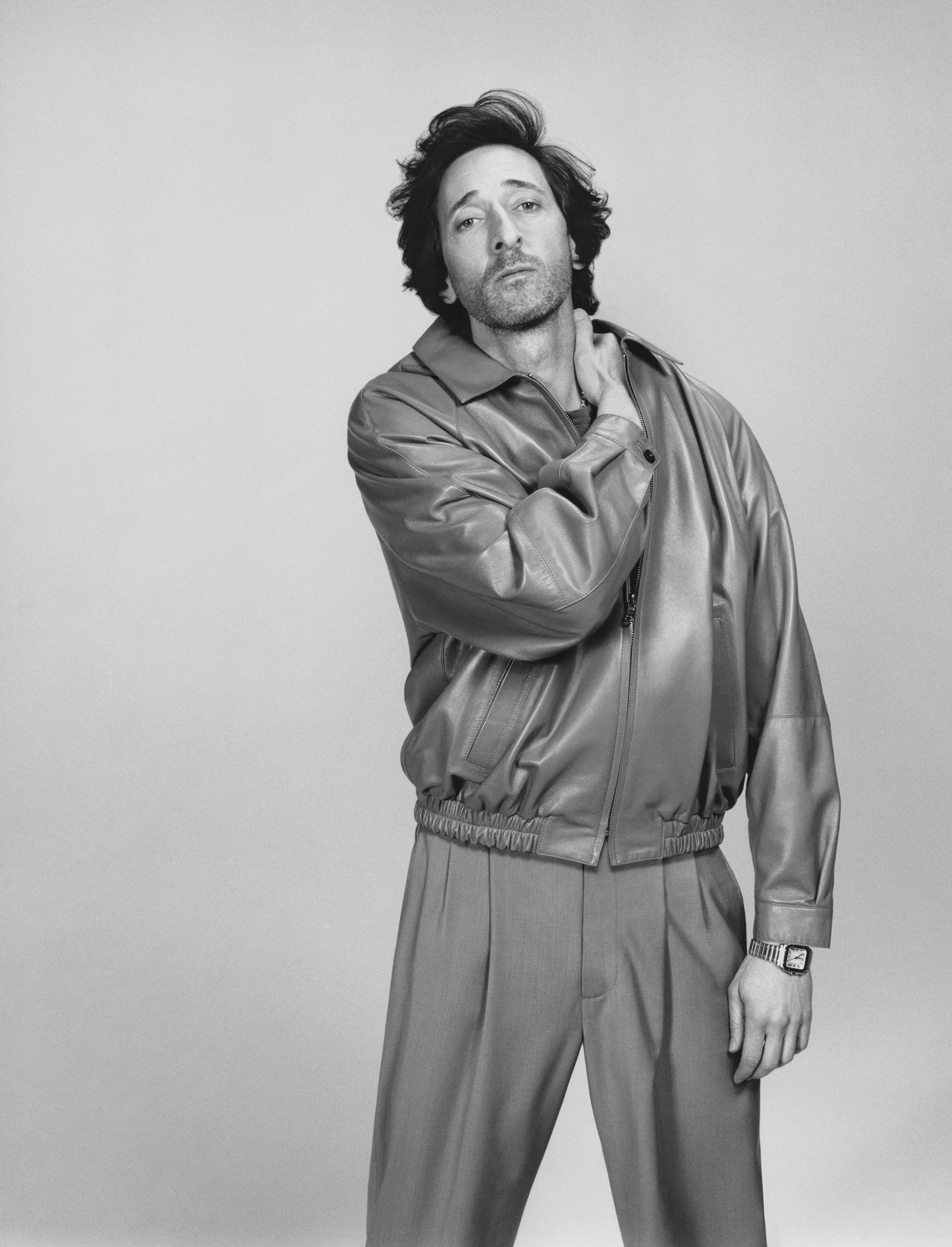
Jacket, Shirt, and Pants by Maryam Nassir Zadeh. Necklace by Tiffany & Co. Watch by Santos De Cartier.
STRONG: I love what you’re saying about the relief of shifting the attention off of ourselves. I read somewhere that the root of the word ecstasy is basically a term for the loss of self. It brings us this sense of being a drop in a bigger ocean. Let’s talk about Winning Time a little bit. I love the show. There’s a beautiful scene where you, as Pat Riley, come in and say something like, “I just want to be around the game. I have more to give to it.”
BRODY: That line spoke to me a lot.
STRONG: Talk about what that meant to you.
BRODY: There’s so much about Pat Riley that I have tremendous admiration for, and I’m astounded by the arc of his life. He triumphed in the game at a very young age, and then found himself retired. Then what, right? That’s where this story picks up. They treated it almost like he was in mourning, which I relate to. Professional sports is such an all-consuming world.
STRONG: Like ours.
BRODY: But more physically demanding and a bit more competitive. I don’t like to view our work in a competitive way. So much in sports is about winning, and the win, as an actor, is much more elusive. Of course, there’s winning—getting the role is a win. And it’s a competitive field, we know that. But the real win is doing the work. Our work is a collaborative thing, which is like a sport. You have to learn how to be that star player, but share that responsibility with the team. I also relate to the shift that comes in life. Pat Riley had so much to give, but he wasn’t welcomed to do it. In my aspirations to write and direct, I have so much that I’m yearning to do. But I see it when I’m working, that it’s not my place to impart certain things. So, I get it. I’ve worked consistently, but there has been a good period of time where I was struggling to find work that was as inspiring and meaningful as what I’m finding now. When you reach a certain level of visible success, there’s an expectation from others for you to maintain that. We would all love to maintain it, but that’s a complex path. They make very few movies comparable to The Pianist,4 for instance, where you have that level of commitment and insight and gravity. And time, frankly. I had six weeks to prepare. Six weeks where I was away on location dieting, learning to play Chopin, confining myself. Those opportunities are very rare. The nature of making independent films has been squeezed. You have five weeks to shoot a whole film now.
STRONG: I remember watching Son of Sam and The Dummy back-to-back and being like, “Holy fucking shit, this guy is a complete chameleon.” You continue to do that, but not always in pieces where your work was supported by the film, or where the work landed with audiences. And that has to be painful, given how much you put into it. In A Matador’s Mistress, your character is a bullfighter who’s lost all of his money and walked all the way from Cordova.5 That resonated with me because I was like, “That’s Adrien. He’s still coming for the ring. He’s going to put himself in there again. And he’s walked all the way from Cordova.” That comes back to Pat Riley, someone whose circumstances made it so that he doesn’t have somewhere to put his gift. And then he does. That must have been a sweet sort of deliverance.
BRODY: Well, he doesn’t yet. It’s a real slow burn. But here’s a man that is so driven. He has moments of doubt like we all do, but he’s tenacious as hell. The circumstances of him becoming coach are remarkable—working his way up from assistant announcer, travel advisor, and god knows what else, that was relatively demeaning work for him. He’s been loved and not loved, but he’s consistently done great work and brought so much to the game. He’s an amazing person to study.
STRONG: And embody. It makes me believe that the roles that we’re meant to play find us. Like Szpilman [in The Pianist] found you. I have to believe that somehow, to the universe, that role was yours. I can’t imagine anyone else doing what you did with it. I feel that way about the role I have right now. Once in a while, something lines up where you feel uniquely equipped to serve a character. We talked about this a bit in Montauk, but I was just thinking about it. You won the Academy Award when you were in your twenties, and you were talking about being at 35,000 feet when you were 29 years old, and there being an expectation that you can just stay at that altitude. How did you manage that? I imagine it was both incredible and a burden.
BRODY: I didn’t think, “I’m going to stay flying high.” I couldn’t have even told you what that was at that moment. It was such a bizarre occurrence, because I had been acting for 17 years. I’d been kicking around, doing plays in junior high in the Lower East Side and Alphabet City, taking the train to drama school, going to auditions, going off here and there.
STRONG: [Fiorello H.] LaGuardia [High School of Music & Art and Performing Arts] itself must have been such a serious thing.6
BRODY: Yeah, and I was already a professional actor before I stepped foot in LaGuardia. But that Academy Award was a remarkable moment to experience, mostly to share with my parents, who had supported me, who didn’t shut me up from being a wild, crazy, imaginative child.
STRONG: That’s so beautiful.
BRODY: The night I won the Oscar I was living in my one-room guesthouse with an outdoor shower, and my parents were staying with me. We went to all these parties and were swept up in a big, amazing blur. I remember crossing a police barricade where all these fans were waiting and I put my Oscar in somebody’s hands, and the cop next to me was like, “Don’t do that, man.” But I just let them hold it. And everybody was in awe—I was in awe. And then we went home to my little place and I put the Oscar down, and my mom said, “There were three of us in this room, and now there are four of us.”
STRONG: Your mom was right. There is a fourth person in the room. It’s a transformational thing. You hear the phrase “journeyman actor”—and I don’t love the term “movie star”—but I think of you as a “journeyman movie star,” which is in its own sort of class, because there aren’t many true movie stars who remain lean and mean in that one-bedroom, committed to the work no matter what heights they rise to. I think that’s laudable.
BRODY: But to your point, I do feel like somehow there’s a delineation between being an actor and being a “movie star.”
STRONG: And there shouldn’t be.
BRODY: There definitely shouldn’t be. The movie star should be a great actor. But it feels more superficial in a sense. The values placed on it are not the values that most people I know who love the occupation have. What I want, and what most actors crave, is the leading role that is a great, nuanced character, not one that’s cleaned up and made into a “movie star character”—one that is nice and tidy. It should be a flawed human being.
STRONG: Fallible.
BRODY: To merge those things is the challenge. I love the entertainment aspect of our world. It’s wonderful to transport people to another place. But we can and should strive for complexity within the work and not feel that we’re somehow alienating people by having that degree of complexity. Because every single person on this planet can relate to complexity.
STRONG: We must strive for it, if our job is to hold up the mirror.
BRODY: That’s what Succession does so well, and your character.
STRONG: Thank you. I read something once that [Rainer Maria] Rilke said: “All good art is a product of having been in danger.” I feel like I look for that in anything I do. Is there risk here? Is there a possibility of endangering myself somehow? You’re not making lazy choices, you’re not making conventional choices. You’re seeking risk and transformation. I also wanted to ask you about your studio and what that is for you.
BRODY: I’ve been building a studio for years; it’s still not finished unfortunately. But I work wherever I am.
STRONG: I talked to you before you were headed to L.A. to do Winning Time and you were renting a studio to paint.
BRODY: Yeah. I had a studio there for years, but I didn’t paint very much. Painting really took hold six or seven years ago when I was feeling a bit of a struggle with the kind of work I was getting. It’s a complex thing to make a film or television project. There are a lot of moving pieces.
STRONG: You’re not as free.
BRODY: It’s just that. Aside from making beats on my own,7 I didn’t have an outlet other than acting. Sometimes if an acting project wasn’t perfect, I’d say, “Well, this seems interesting. I kind of like the vision of the filmmaker. I believe that, even though he hasn’t shown much in the past, he’s going to strive to do something with this. I could fix these certain things in the dialogue. They’re open to that. Let’s get in and start getting creative.” And then, those movies don’t necessarily turn into great work. And that fourth man in the room is there going, “What are you doing?” People are going, “Hey, where is that guy? Where’d you put him?” So the beauty of painting for me was that I could pour all of that creativity into something that I had control of.
STRONG: Yeah, self-sovereignty, which we don’t often have as actors.
BRODY: It’s funny, because I’ve been working on a lot of really great stuff lately, and I haven’t had that in a long time, not on this level. I’d forgotten what that felt like. It’s joyous, but it’s maddening, too. I’m seeing a bunch of things fall through the cracks because I’m busy. And work begets work. When things are cooking, it’s like, “I remember you now.” That’s the beauty and the burden of film—you will be remembered.
———
1. Clean stars Brody as a garbage worker forced to reckon with his violent past.
2. Brody debuted the series of artworks at Miami Art Basel in 2015.
3. Brody starred in the 2014 miniseries about the legendary magician’s life.
4. Brody became the youngest person to win the Oscar for Best Actor for his portrayal of the pianist and composer Władysław Szpilman.
5. In the 2008 drama, Brody stars as the legendary matador Manolete opposite Penélope Cruz.
6. Brody graduated from the famed performing arts school in 1991.
7. Brody has been producing hip-hop beats since the ’90s.
———
Grooming: Jakob Sherwood using La Mer and R+Co at The Wall Group
Set Design: Eric Metman for Bryant Artists
Production: Candice Hernstad and Webber
Photography Assistant: Dean Dodos
Fashion Assistants: Merve Eltemur, Minji Kim, and Lyndsea Lamar
Grooming Assistant: Harley Beman
Production Assistant: Jimmy O’Brien

